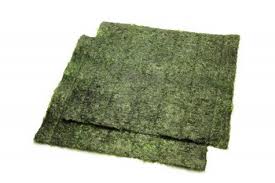 Nori is by far the most widely consumed seaweed in the world, serving as the backbone for all sushi. For this reason, it is no surprise that the Japanese have mastered its production, and remain the larger producer in the world to this day. Use of nori can be traced to well before the 7th century, when it was mostly consumed in its raw form. Today, nori is typically harvested from the sea in autumn. Next, the Japanese wash the seaweed to remove excess sea salt, then cut it into small pieces before setting it into dry sheets. Finally, nori is dried in the sun, where it takes on its common appearance which is known around the world.
Nori is by far the most widely consumed seaweed in the world, serving as the backbone for all sushi. For this reason, it is no surprise that the Japanese have mastered its production, and remain the larger producer in the world to this day. Use of nori can be traced to well before the 7th century, when it was mostly consumed in its raw form. Today, nori is typically harvested from the sea in autumn. Next, the Japanese wash the seaweed to remove excess sea salt, then cut it into small pieces before setting it into dry sheets. Finally, nori is dried in the sun, where it takes on its common appearance which is known around the world.
Due to the popularity of sushi, Nori can be found in almost every grocery store in the United States. Sold in sheets which are approximately 8” by 7”, try adding a bit of rice wine vinegar mixed with water when re-hydrating before use. Besides sushi, nori can be used to flavor soup, stews and fish dishes.
Key Nutrients
Nori is high in protein and vitamins A and B1, and contains zinc, iron and calcium. Being algae, it is very high in dietary fiber while having a low amount of saturated fat.
Health Benefits
Vitamin B1 – Thiamine is an important vitamin since it breaks down sugars in the body. Thiamine also helps to support nerve and heart health.
Vitamin A – Vitamin A, when converted into retinaldehyde, is a vital compound for healthy eyes. Furthermore, vitamin A is believed to fight against cataracts, macular degeneration and glaucoma. Vitamin A strengthens the membranes of the human body such as mucous membranes, respiratory, urinary and intestinal tracts. It is also essential for the lymphocytes, or white blood cells, that fight infection once in the body.
Iron –Iron, found in red blood cells, is an integral part of hemoglobin. Hemoglobin carries oxygen from the lungs to the cells. Iron is an essential component of many enzymes necessary for various chemical reactions in the body.
Calcium – Calcium is an important mineral for bone and teeth growth and maintenance. It is also an important mineral in terms of cardiovascular function.
Zinc – The health benefits of Zinc include proper functioning of immune system, digestion, control of blood sugar and energy metabolism.
Season
Being a dried seaweed product, nori can be found year round in any grocery store or Asian supermarket.
Nutrition Information
Per 1 Tablespoon:
Calories (cKal): 20
Protein (grams): 2
Total Fat (grams): 0
Carbohydrates (grams): 2
Fiber (grams): 1
Buying and Storing
Nori can be purchased in most supermarkets and Asian specialty markets. Store the nori in its packaging for up to six months. Once opened, store the dried seaweed in an air tight container of plastic zip lock bag for up to one month.
Best Way to Add to Diet
The most traditional way to use Nori is when making sushi. However, a great way to add nori to your diet is by cutting into thin strips and adding to a soup or stew. When braising fish, nori can add a wonderful taste to a piece of halibut or trout.
Nori recipe

 Not Sure What Healthy Foods To Eat?
Not Sure What Healthy Foods To Eat? This week we take a look at one of my favorite healthy foods...the mighty Avocado.
This week we take a look at one of my favorite healthy foods...the mighty Avocado.
No comments yet.